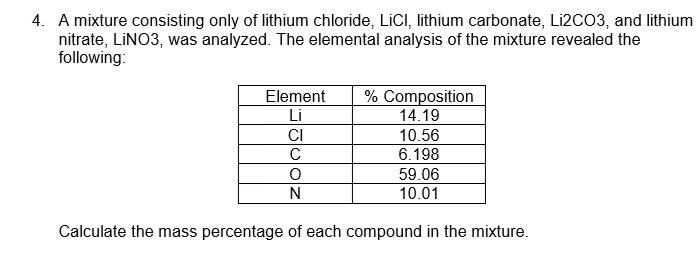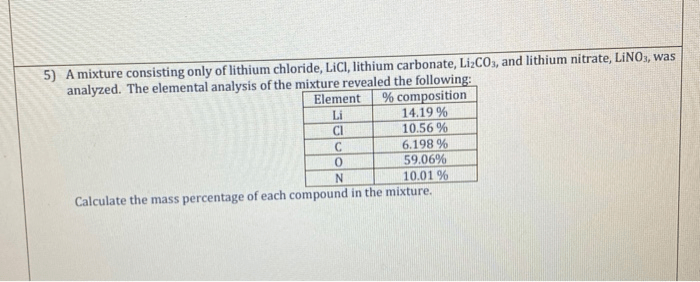A mixture consisting only of lithium chloride presents a fascinating subject for scientific inquiry, offering insights into the realm of physical chemistry and its practical applications. This in-depth exploration delves into the unique properties, diverse applications, and intricate molecular interactions that characterize this intriguing compound.
Lithium chloride, a salt composed solely of lithium and chlorine atoms, exhibits a remarkable array of properties that distinguish it from other ionic compounds. Its exceptional solubility, well-defined melting and boiling points, and high chemical stability make it a versatile material with wide-ranging industrial and commercial applications.
Properties of Lithium Chloride
Lithium chloride is an inorganic compound with the chemical formula LiCl. It is a white crystalline solid that is highly soluble in water. Lithium chloride has a melting point of 614 °C and a boiling point of 1360 °C. It is a stable compound that does not decompose easily.
Solubility
- Lithium chloride is highly soluble in water. At 25 °C, 100 g of water can dissolve up to 83 g of lithium chloride.
- It is also soluble in other polar solvents, such as ethanol, methanol, and acetone.
Melting and Boiling Points
- Lithium chloride has a relatively low melting point of 614 °C.
- Its boiling point is 1360 °C.
Chemical Reactivity
- Lithium chloride is a relatively unreactive compound.
- It does not react with most other chemicals at room temperature.
- However, it can react with strong acids and bases to form lithium salts.
Applications of Lithium Chloride

Lithium chloride has a wide range of industrial and commercial applications.
Batteries
- Lithium chloride is used as an electrolyte in lithium-ion batteries.
- These batteries are used in a variety of electronic devices, such as laptops, cell phones, and electric vehicles.
Pharmaceuticals
- Lithium chloride is used in the treatment of bipolar disorder.
- It is also used as a sedative and hypnotic.
Metallurgy
- Lithium chloride is used as a flux in the soldering and welding of metals.
- It is also used in the production of lithium metal.
Water Treatment
- Lithium chloride is used as a water softener.
- It can also be used to remove heavy metals from water.
Air Purification
- Lithium chloride is used as a desiccant in air purification systems.
- It can remove moisture from the air, which can help to prevent the growth of mold and mildew.
Production of Lithium Chloride: A Mixture Consisting Only Of Lithium Chloride

Lithium chloride can be produced from a variety of sources.
Extraction from Natural Sources
- Lithium chloride can be extracted from brines and salt lakes.
- These brines contain high concentrations of lithium chloride, which can be extracted using evaporation or ion exchange.
Chemical Synthesis
- Lithium chloride can also be produced by the reaction of lithium hydroxide with hydrochloric acid.
- This reaction produces lithium chloride and water.
Health and Safety Considerations

Lithium chloride is a relatively safe compound, but it can be harmful if it is ingested or inhaled.
Toxicity
- Lithium chloride is toxic if it is ingested.
- The oral LD50 for rats is 526 mg/kg.
Handling Precautions
- Lithium chloride should be handled with care.
- It should not be ingested or inhaled.
- If lithium chloride comes into contact with the skin, it should be washed off immediately with soap and water.
First Aid Measures, A mixture consisting only of lithium chloride
- If lithium chloride is ingested, the person should drink plenty of water and seek medical attention immediately.
- If lithium chloride is inhaled, the person should be moved to fresh air and seek medical attention immediately.
Environmental Regulations
- Lithium chloride is not considered to be a hazardous waste.
- However, it should be disposed of properly in accordance with local regulations.
Expert Answers
What are the key physical properties of lithium chloride?
Lithium chloride is characterized by its high solubility in water, low melting and boiling points, and cubic crystal structure.
What are some industrial applications of lithium chloride?
Lithium chloride finds applications in batteries, pharmaceuticals, metallurgy, water treatment, and air purification.
How is lithium chloride produced?
Lithium chloride can be extracted from natural sources such as brines or produced synthetically through chemical reactions.
What are the potential hazards associated with lithium chloride exposure?
Exposure to lithium chloride can cause skin and eye irritation, respiratory problems, and, in high doses, more severe health effects.